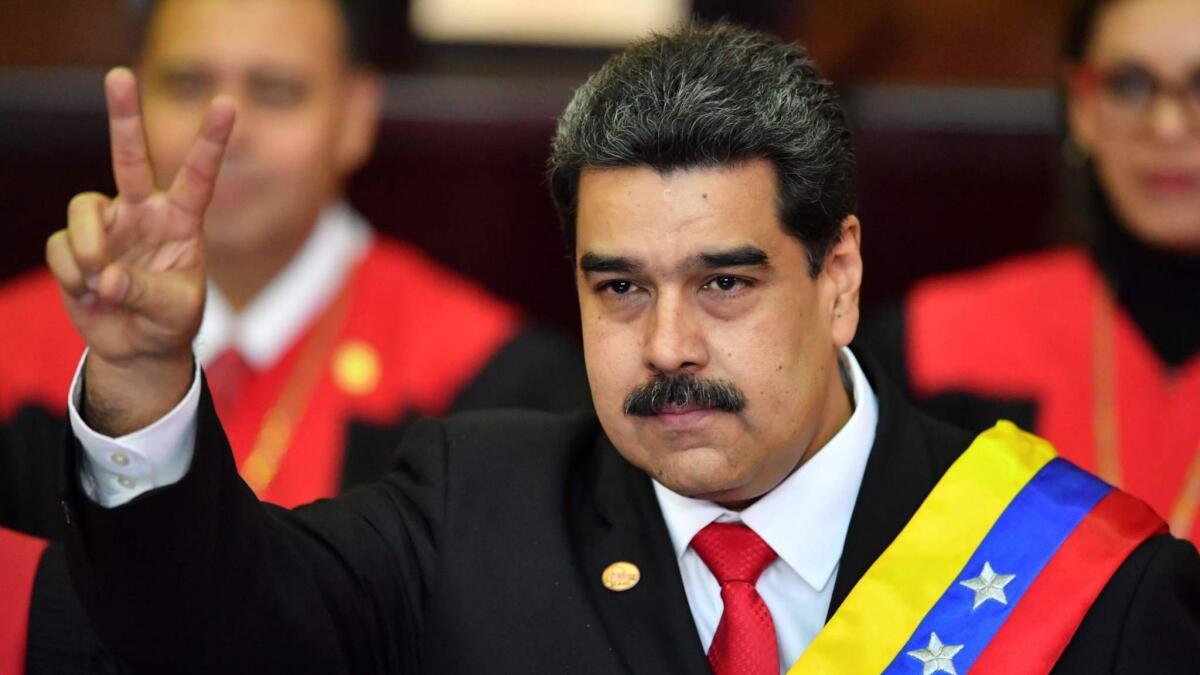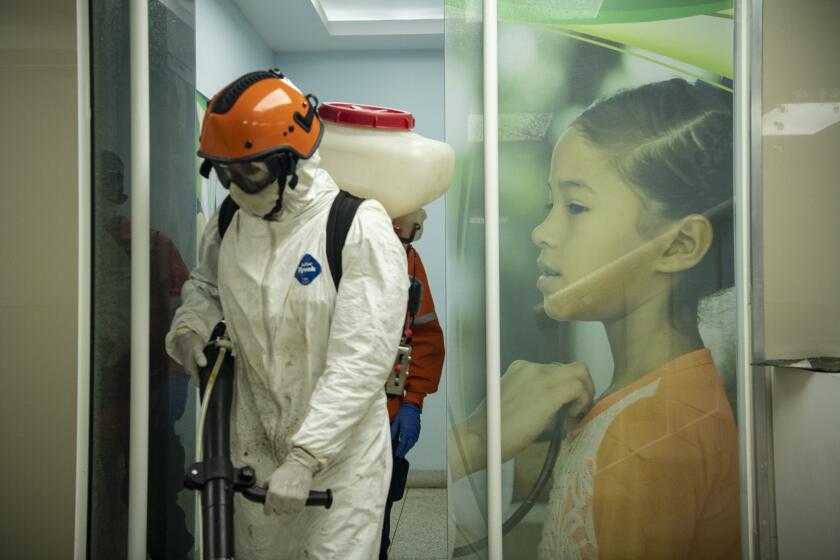Op-Ed: Can justice for Maduro bring peace to Venezuela?

On Tuesday, Secretary of State Michael R. Pompeo unveiled a detailed framework for restoring democracy in Venezuela that was immediately rejected by the man who would need to step aside for such a transition to occur: Venezuelan dictator Nicolas Maduro. Perhaps this should not come as a surprise, given that just last week the U.S. Department of Justice charged Maduro with narco-terrorism and put a $15-million price on his head.
Many Venezuelans reacted with understandable satisfaction to the indictment of Maduro and some of his closest collaborators. President Trump further rattled sabers by announcing a buildup of his administration’s counternarcotics operation off Venezuela’s coast, though the U.S. is unlikely to drag Maduro into court anytime soon. This will come as a disappointment to the Venezuelan diaspora in the United States, concentrated not coincidentally in the electoral battleground state of Florida. But for those victimized by Maduro’s well-documented repression, corruption and sheer incompetence, the salient fact remains that someone is taking steps to hold the deeply unpopular Maduro regime accountable.
As the U.S. struggles to restore democracy in Venezuela, however, it will have to reconcile these criminal indictments with Pompeo’s more conciliatory framework, which proposes a transitional unity government and a sequence of steps leading to new elections. In return for these steps, the U.S. would incrementally lift sanctions, which have been criticized for cutting off Venezuela’s oil revenue while the country tries to prevent a COVID-19 catastrophe.
Legally speaking, the fact that the U.S. does not consider Maduro Venezuela’s legitimate president is sufficient to overcome the customary immunity enjoyed by heads of state, as it was three decades ago in the case of Panamanian strongman Manuel Noriega.
But from the standpoint of U.S. foreign relations, seeking the arrest and prosecution of a de facto leader bears many of the same weighty consequences as indicting a recognized head of state. So the indictment of Maduro and other top officials raises important strategic questions. Most fundamentally, how does it advance the Trump administration’s stated objective of a peaceful, democratic transition in Venezuela, which Pompeo’s framework aims to achieve?
The White House likely views the indictments as the next step in its “maximum pressure” campaign against Maduro — an escalation, perhaps, but a logical one. The U.S. will interpret recent developments as evidence that its efforts to asphyxiate the regime are succeeding — the collapse in Venezuelan oil production and sales, the gasoline shortages in Caracas, and Maduro’s doomed-to-fail appeal for a $5-billion loan from the International Monetary Fund.
Venezuela is woefully unprepared for coronavirus. The Trump administration sees that as another chance to remove President Nicolas Maduro.
The administration presumably calculates that as funds dry up, those who keep Maduro in power — most prominently, Venezuela’s armed forces — will cut him loose. Under this theory, the indictments speed Maduro’s demise by undercutting his legitimacy and eroding the cohesion of his collaborators, some of whom will look to abandon a sinking ship — with the U.S. transition framework the life raft.
The first challenge to this approach is that maneuvers that have tried to splinter the regime or provoke its collapse have yet to work. Efforts to force Maduro from power through a combination of domestic mobilization, international isolation and economic pressure reached their zenith in early 2019, when opposition leader Juan Guaido emerged from obscurity to lead mass demonstrations and was widely recognized as Venezuela’s interim president. Even then, a scheme to convince military leaders to remove Maduro failed spectacularly.
The regime is weaker economically today, but Maduro has sources of revenue beyond oil, including the illegal gold trade and other criminal activities. And the United States’ ability to assess the loyalty of the military brass, much less fracture it, has proven limited. While Pompeo’s transition framework offers assurances to the military, such as keeping Minister of Defense Vladimir Padrino Lopez in place, the fact that Padrino was indicted just a week before the framework was announced will do little to convince his comrades in arms to put their fates in the hands of a government they have been indoctrinated to abhor.
A second challenge is that the indictments tie the hands of the Trump administration and Guaido by rendering any negotiated pathway to a democratic transition even more complex. Remarkably, this includes the roadmap Pompeo put forward, which largely replicates a sensible proposal Guaido’s representatives made during unsuccessful negotiations with Maduro last summer. It would require both Maduro and Guaido to step aside, and their parties to govern together until elections are called. At the time, the Trump administration threw cold water on the talks. Now it appears to be belatedly embracing the proposal. The result is strategic confusion.
In what may be the most enduring foreign-policy consequence of last week’s indictments, any effort to incentivize political compromise and power-sharing is overshadowed by the actions of the Department of Justice. Unlike asset freezes and visa bans, public indictments cannot be easily quashed to reward positive behavior or traded away in a deal for new elections. The U.S. has in essence demanded the unconditional surrender of not just Maduro, but many of the most frequently mentioned candidates who might push him aside. Arguably, the accused now have even more motivation to close ranks and crush their opponents, at a time when Venezuela needs just the opposite.
On top of its existing institutional and humanitarian crises, Venezuela is staring down the barrel of COVID-19, armed with a health system that has collapsed due to Maduro’s corruption and neglect. In recent days, civil society leaders appealed for a humanitarian truce between the country’s political factions in a desperate attempt to mobilize international assistance for coronavirus response. As Pompeo’s transition framework seems to recognize, Venezuela needs political solutions now more than ever. Last week’s indictments may make that even harder than before.
Michael J. Camilleri is director of the rule of law program at the Inter-American Dialogue.
More to Read
A cure for the common opinion
Get thought-provoking perspectives with our weekly newsletter.
You may occasionally receive promotional content from the Los Angeles Times.











